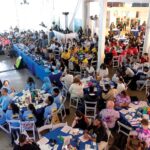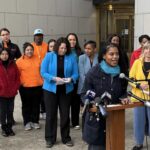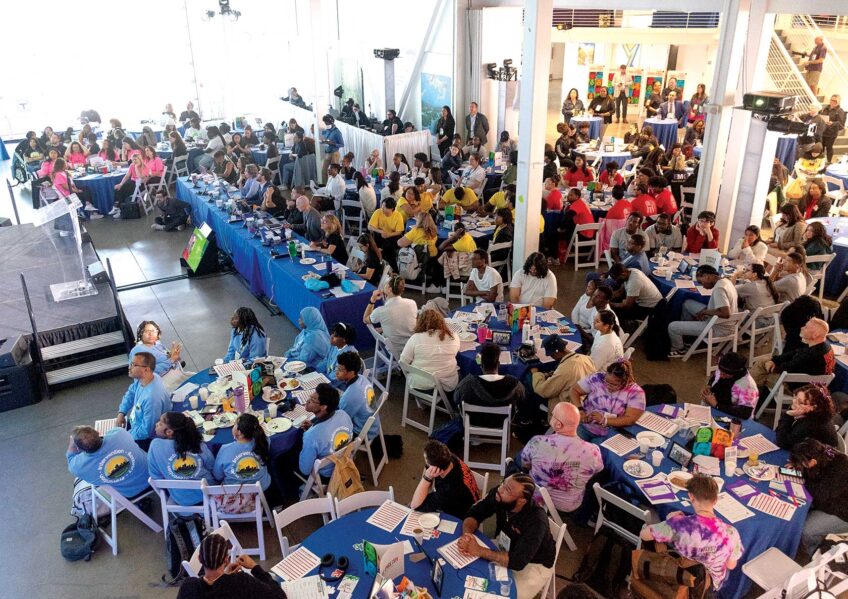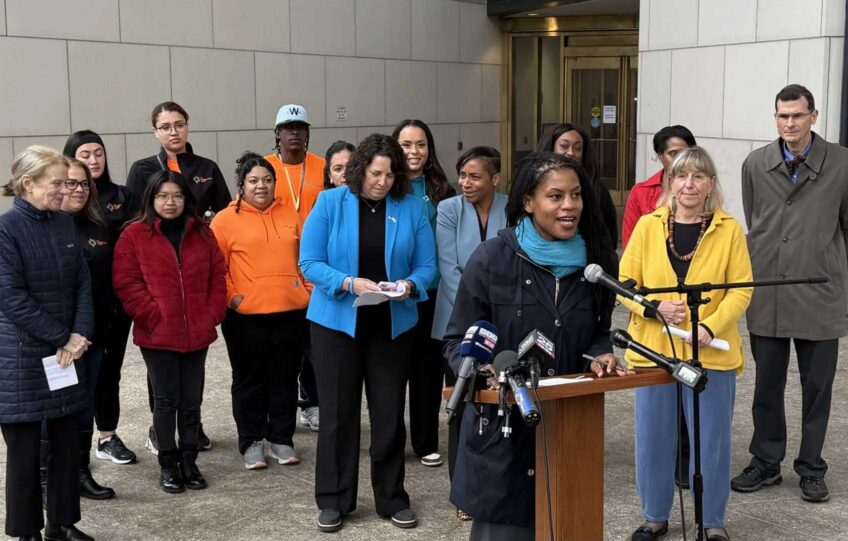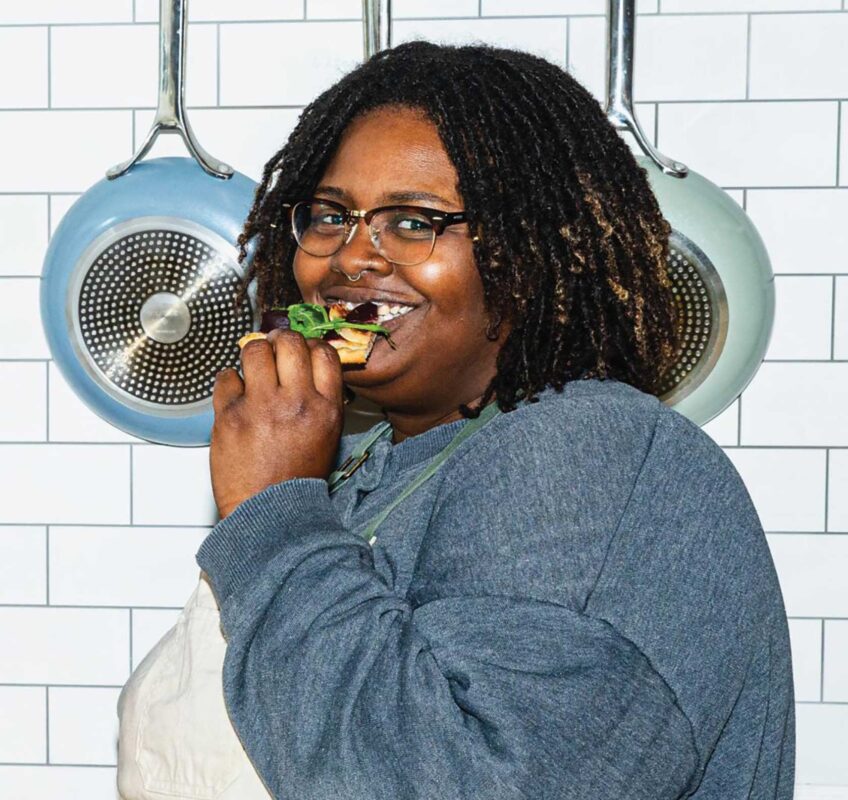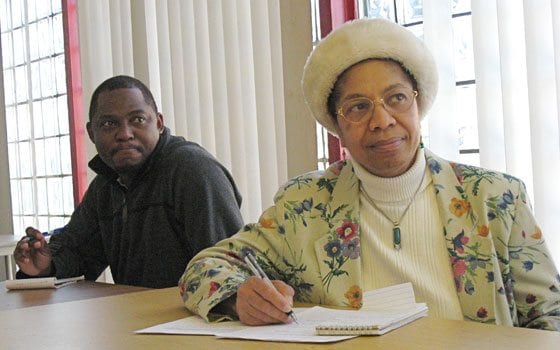

Author: Sandra LarsonBeginning Spanish students Roland Matsouaka (left) and Charlene Reese take notes during a recent Friday morning class at the Dudley Literacy Center, located behind the Dudley branch of the Boston Public Library in Roxbury’s Dudley Square. The center helps Boston residents develop new skills as well as build new cross-cultural bridges.
At Dudley center, drive to learn spans barriers
It’s 9:50 on a Friday morning, and sunlight filters through the tall glass-block windows of a classroom in the Dudley Literacy Center. In the high-ceilinged room, volunteer teacher Fernando Bernava clears a whiteboard, readies his teaching materials and waits for his first group of beginning Spanish students to trickle in.
“¡Hola! ¿Cómo estás?” he calls out as they arrive, challenging each one to return the greeting. He persists, drilling them with basic conversation (“What is your name? Where are you from?”) and having them direct the same questions to a classmate.
For the next three hours, Bernava, a youthful 42-year-old with brown hair that flows down to his shirt collar, works with high energy and a broad smile to impart Spanish conversation and pronunciation skills to three groups of adult learners.
“You never know when you’ll use Spanish,” said Bernava, a native of Argentina who came to Boston with his family in 2001 to be near specialized medical care for one of his children.
“This is good for Spanish speakers and English speakers,” he said. “It’s building a bridge.”
At Dudley Literacy Center, the bridge goes both ways. A volunteer teacher brings a diverse set of students closer to Spanish, while the center strives toward its wider mission to bridge other gaps — in literacy, English knowledge and basic computer skills — that prevent people from participating fully in society. Communication is an integral part.
Bernava teaches three classes in a row each Friday. He receives no pay for the classes, which are offered at no charge to students. But he said he is passionate about his mission of connecting cultures.
His students range in age from mid-30s to over 60. They are white, black, Asian. They come from all over Boston, arriving in Roxbury’s Dudley Square by bus and by car.
In one class, a priest from South Boston sits across the table from a retired grandmother from Mattapan. In another, a biostatistics graduate student, a bus driver, an artist and a nursing home volunteer share laughs as they struggle to remember new vocabulary words.
“I want to be bilingual,” said student Betty Pasley, 54, who lives in Hyde Park but works as a tax preparer near Dudley Square. “I had said for years, I want to be bilingual by 55.”
While she’s not yet able to converse with Spanish-speaking clients, she said, “I can give them our hours, at least.” She used to tune out when she didn’t understand the language.
“Now I tune in,” she said.
Pasley told her friend, Rosa Allen of Mattapan, about the class, and the two attended the Friday morning meeting together.
“I love the language, and I need to keep my brain occupied,” said Allen, 56, who described herself as a housewife.
“And a granny,” her friend added.
Maureen Leonard, 60, a property manager and artist, said she hopes to travel to Spain. But she is using her Spanish already, without leaving town. She speaks the language with a Guatemalan classmate in an art class she attends, and said that knowing a few Spanish phrases has allowed her to give — and receive — a helping hand.
“Sometimes in the street if someone asks directions, I can help them,” Leonard said. “And once, some kids who spoke only Spanish were able to help me.”
Bernava first discovered the Dudley Literacy Center, a service of the Boston Public Library located just behind the library’s Dudley Square branch, when he was seeking materials for learning English. Having taught for years in Argentina, he approached literacy coordinator JoAnn Butler two years ago about starting a Spanish course.
“I thought it would be an unusual program,” said Butler, who heads the Dudley Literacy Center’s staff of three.
It’s unusual, she said, because the center’s focus is normally on helping people grow into English speakers and develop their English language skills. The Dudley Literacy Center offers English classes and conversation groups, as well as a variety of other resources. Adults learning to read, write or use computers can get tutoring help, and assistance is available for those preparing to take GED and U.S. citizenship tests.
But Butler said they had received requests for Spanish classes from local residents who could use Spanish in their jobs. She agreed to run the class.
“I thought it would be a good service to the neighborhood,” she said.
As the Spanish program began its second year last fall, Bernava was gratified to hear the class had a waiting list. He added another beginner section and an intermediate class.
Bernava said his teaching approach is the opposite of how he learned English.
“I learned English here in the United States. I started with the grammar,” he said. “That was very hard for me, very complicated. I needed to translate everything.”
Instead, his classes emphasize conversation and practice.
“I think the people enjoy it,” he said. “They learn a lot. I start to speak slowly in the first three months, and now I say the same thing, faster — and they understand me.”
Bernava uses exaggerated gestures to illustrate without translating.
“Hoy es viernes…,” he begins. Today is Friday. He points with his thumbs back over his shoulders to indicate, “What came before?”
Changing topics, he gives an order in Spanish: “Take a marker and draw an orange triangle.”
A student goes to the whiteboard, picks up an orange marker and draws a triangle. Her classmates applaud. “Very good!” Bernava says.
It sounds like preschool, but these adult students show no self-consciousness about that. They are beginners, and they know it. They appreciate these building blocks.
“I like that it’s different,” said Roland Matsouaka, 35, a native French speaker from the Democratic Republic of Congo who studies biostatistics at Harvard University. “Not grammar, grammar, grammar — but learning the language as kids learn it.”
Dorothy Smith, an MBTA bus driver from Charlestown, first enrolled with her 5-year-old grandniece who wanted to learn Spanish. The little girl soon tired of being the only child at the table, but Smith was hooked.
“I pick up a lot of people on my route that speak Spanish,” said Smith, 53. “Right now, I’m still struggling. I know what they’re saying, but I don’t know how to respond yet. So I just listen in and try to pick it up.”
She said she has also taken to reading El Planeta, a local Spanish-language weekly newspaper.
“I’m very pleased with the class, very happy,” she said. “I’m thinking that one of these days I’m just going to start speaking Spanish, and I won’t even need to think about it.”


